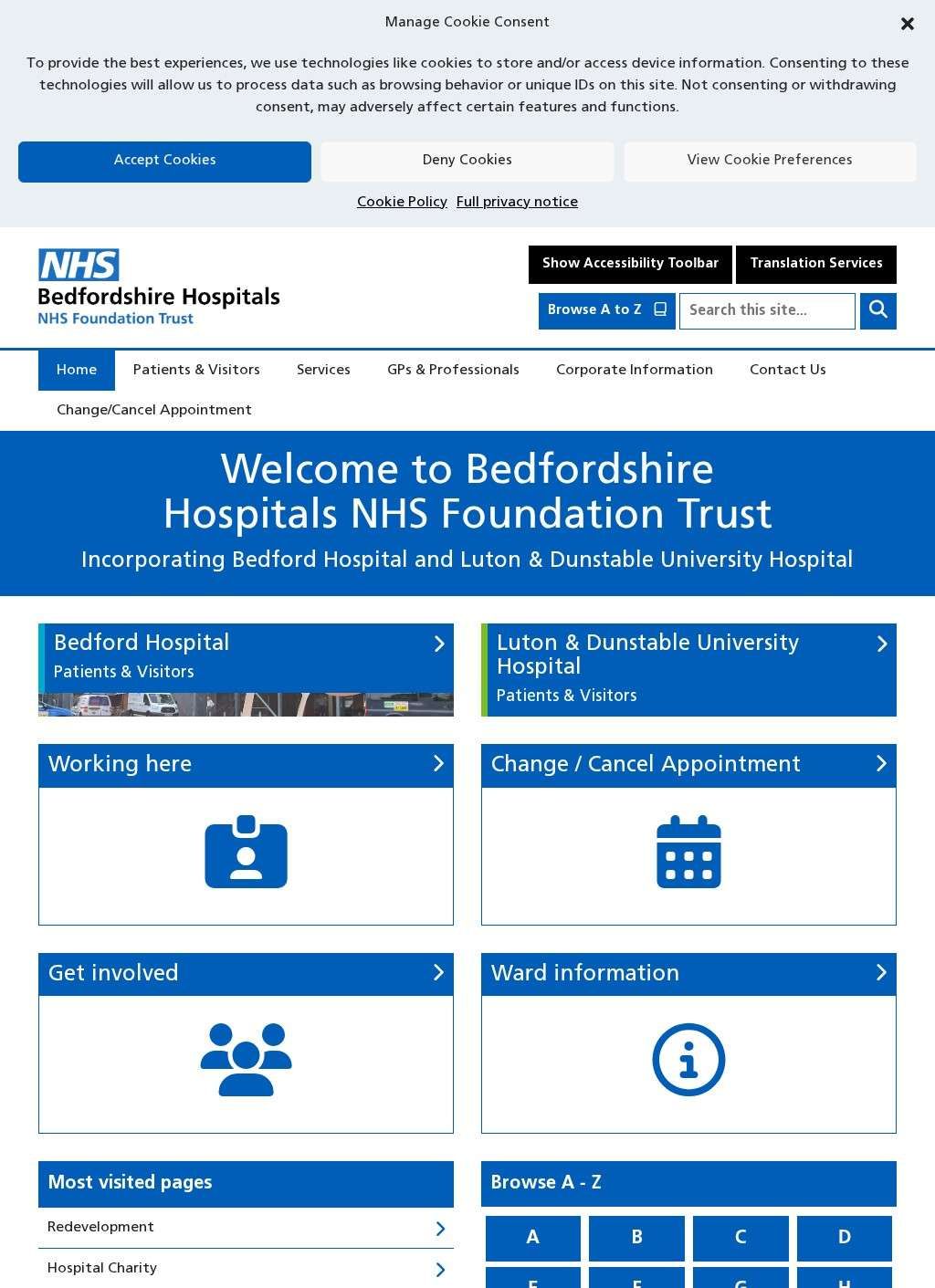Bedfordshire Hospitals NHS Foundation Trust emerged in April 2020 through the strategic acquisition of Bedford Hospital NHS Trust by Luton and Dunstable University Hospital NHS Foundation Trust, creating a unified healthcare delivery system serving the entire Bedfordshire region. This consolidation brought together two well-established healthcare institutions with complementary strengths, forming a foundation trust that delivers acute hospital services to a catchment population exceeding 500,000 residents across Bedfordshire and surrounding areas, including significant cross-border patient flows from neighboring counties and London boroughs.
Bedford Hospital anchors healthcare delivery in the northern part of the county, operating as a 400-bed district general hospital located in the Cauldwell area of Bedford on Britannia Road and Ampthill Road. The facility traces its origins to 1803 when it was established through the philanthropy of Samuel Whitbread, the renowned brewer who bequeathed £8,000 for hospital construction. Modern developments have transformed the original Victorian institution into a contemporary healthcare facility featuring the Cygnet Wing and comprehensive emergency services, while maintaining its historical connection to the local community through architectural preservation and community engagement programs.
Luton and Dunstable University Hospital serves as the trust's larger facility, providing tertiary-level services alongside district general hospital functions for the southern Bedfordshire region. The hospital's university designation reflects its extensive medical education partnerships and research activities, particularly in areas including cancer treatment, emergency medicine, and surgical innovation. The facility houses sophisticated diagnostic equipment, specialized treatment units, and academic departments that contribute to medical knowledge while delivering cutting-edge care to patients across the region.
Emergency department services operate at both hospital sites, providing 24/7 emergency care with Bedford Hospital offering general emergency services while Luton and Dunstable University Hospital provides additional specialized emergency care including a dedicated Paediatric Emergency Department. These services coordinate closely with regional ambulance services, air ambulance operations, and other emergency response agencies to ensure rapid access to appropriate care for medical emergencies, trauma cases, and urgent healthcare needs across the geographic region.
Women and children's health services represent a particular strength across both hospital sites, with comprehensive maternity services, neonatal intensive care, pediatric services, and gynecological care. Recent developments have included service expansions and facility improvements designed to enhance patient experience and clinical outcomes. The trust coordinates with community midwifery services, health visitors, and pediatric community services to provide integrated care pathways supporting families from pregnancy through childhood and into adult healthcare transitions.
Specialist clinical services encompass extensive outpatient clinics, diagnostic imaging, pathology services, and surgical specialties distributed across both hospital sites according to clinical expertise and resource optimization. Cancer services receive particular emphasis, with multidisciplinary teams providing diagnosis, treatment, and ongoing support for cancer patients. The trust participates in national cancer networks and clinical trials, ensuring patients access the latest treatment protocols and innovative therapies while contributing to advancing cancer care knowledge.
Medical education and research activities flourish through partnerships with medical schools, nursing colleges, and research institutions. The university hospital designation supports undergraduate and postgraduate medical training, nursing education, and continuing professional development for healthcare staff. Research programs contribute to medical advancement while providing patients access to clinical trials and innovative treatments not otherwise available, positioning the trust as a leader in healthcare innovation within the East of England region.
Community partnerships extend beyond acute hospital services through collaboration with general practitioners, community health services, mental health providers, and social care organizations. The trust coordinates with local councils, voluntary sector organizations, and other NHS providers to ensure seamless care transitions and integrated support for patients with complex needs. Discharge planning services work extensively with community partners to facilitate appropriate care transitions and prevent unnecessary hospital readmissions.
Quality improvement initiatives focus on patient safety, clinical effectiveness, and patient experience through systematic monitoring, improvement programs, and staff development. The Care Quality Commission ratings demonstrate the trust's commitment to high-quality care, with ongoing improvements in response to inspection findings and patient feedback. Patient and family advisory groups contribute to service development, ensuring care delivery reflects patient needs and preferences while maintaining clinical excellence standards.
Digital health initiatives include electronic patient records, online appointment booking, patient portals, and telemedicine services that enhance access to care while improving care coordination between different healthcare providers. The trust invests significantly in healthcare technology, including diagnostic equipment, surgical robots, and information systems that support clinical decision-making and patient safety while improving operational efficiency across both hospital sites.
Workforce development encompasses recruitment, retention, and professional development programs designed to maintain staffing levels and clinical expertise in an increasingly competitive healthcare employment market. The trust coordinates with regional workforce planning initiatives, educational institutions, and professional bodies to ensure adequate staffing while providing career development opportunities that attract and retain high-quality healthcare professionals across all disciplines and specialties.
Patient feedback mechanisms include formal complaints procedures, patient satisfaction surveys, patient and family advisory groups, and real-time feedback systems that inform service improvements and quality enhancement initiatives. The trust maintains active engagement with local communities through health promotion activities, public health partnerships, and community health initiatives that address local health inequalities and promote disease prevention across the populations served by both hospital sites.
